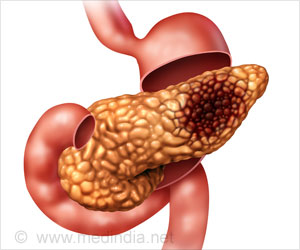Highlights
- It is thought that the sudden deterioration of diabetes type 2 and the use of incretins to manage it could be one of the triggers of pancreatic cancer.
- Incretins are used when oral anti-diabetic drugs fail in controlling the sugar levels and work by stimulating the pancreas, and it is thought to promote the occurrence of pancreatic cancer.
- But new study states the phenomenon of 'reverse causation', where actually the hidden pancreatic cancer is responsible for the rapid deterioration of the existing type 2 diabetes.
- 50% of all pancreatic cancers cases were diagnosed within one year of patients being diagnosed with type 2 diabetes and being given their first prescription to control it.
"In Belgium 25% of cases were diagnosed within 90 days and in Lombardy it was 18%. After the first year, the proportion of diagnosed pancreatic cancers dropped dramatically," she said.
Pancreatic cancer is very difficult to be detected at an early stage and has very few effective treatments. Therefore, is one of the most lethal cancers.
Less than one percent of people live for ten or more years after a diagnosis.
In 2012, around 104,000 new cases were diagnosed in Europe and approximately the same number of people died from it.
There were an estimated 53,070 new cases of pancreatic cancer in 2016 in U.S.
Reverse Causation
Ms Koechlin Autier said "Although it has been known for some time that there is an association between type 2 diabetes and pancreatic cancer, the relationship between the two conditions is complex. Incretin therapies reduce diabetic hyperglycemia through stimulating the release of insulin by the pancreas. These drugs are typically prescribed when the oral anti-diabetic drugs can no longer control blood glucose levels. Because of their stimulating effects on the pancreas, it has long been thought that the incretin therapies could promote the occurrence of pancreatic cancer."
But pancreatic cancer is known to cause diabetes.
Ms Alice Koechlin, Professor Philippe Autier and colleagues in Belgium and Italy used prescription data to identify 368,377 patients with type 2 diabetes in Belgium between 2008 and 2013 and 456,311 patients in Lombardy between 2008 and 2012.
The data were linked to pancreatic cancer cases in the Belgian Cancer Registry and the hospital discharge databases in Lombardy. There were 885 and 1,872 cases of pancreatic cancer diagnosed during this time in Belgium and Lombardy respectively.
In the first three months after their prescription for incretins, which are metabolic hormones that stimulate the pancreas to produce more insulin to lower blood glucose levels, patients in Belgium and in Lombardy had a 3.5-fold greater risk of being diagnosed with pancreatic cancer, compared with patients who were able to continue with oral anti-diabetic drugs.
The risk subsequently fell to 2.3-fold in the next three to six months, to a 2-fold for the next six to 12 months and 1.7-fold risk after the first year.
The switch to incretins or insulin happened faster among diabetic patients who were subsequently diagnosed with pancreatic cancer, but who were managing it will oral anti-diabetic drugs.
This switch to a more aggressive anti-diabetic therapy with injections of insulin was associated with a seven-fold increased risk of being diagnosed with pancreatic cancer.
This study shows that incretin therapies are often prescribed to patients whose diabetes is caused by a still undiagnosed pancreatic cancer.
But because the pancreatic cancer ultimately gets diagnosed, it looks like it is the intake of incretin drugs that could be the trigger of the pancreatic cancer, while in reality, it is the pancreatic cancer that causes a sudden deterioration of diabetes, which is followed by the prescription of incretins.
This phenomenon is called 'reverse causation'.
"Our study also shows that the reverse causation observed for incretin drugs is also observed for other anti-diabetic therapies, in particular for insulin therapy." Autier added.
Chair of the Congress and President of ECCO, Professor Peter Naredi, from the Sahlgrenska Academy, University of Gothenburg, Sweden commented "Due to the severity of pancreatic cancer and because only a minority of cases are detected at a curable stage, we must find better ways for early detection. Some advances have been made in the search for blood biomarkers. The study by Autier and colleagues opens up the possibility to combine the diagnosis of an associated disease, type 2 diabetes, with blood biomarkers. It is a step in the right direction if we can increase the proportion of early diagnosed pancreatic cancers."
Since detection of pancreatic cancer is difficult, researchers hope that the findings will encourage the search for blood markers that could be used as a first-line for the detection of pancreatic cancer. They also stated that using prescription databases in the way that they have, could help to develop methods to identify early, non-symptomatic pancreatic cancer.
Reference
- Cancer Stat Facts: Pancreas Cancer - (https://seer.cancer.gov/statfacts/html/pancreas.html)
Source-Medindia















